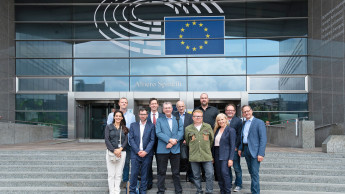

The summer of 2006 was marked by outbreaks of the Koi Herpes Virus (KHV) in nearly all European countries. The EU approved a directive making the virus a notifiable disease
Download: KHV is a European problem (PDF-File)However, this directive does not come into force until 1st April 2008. One of the few countries in Europe which already has a notification system in place is Germany, although in Germany it applies only to the food carp industry. Most probably the obligation to notify the authorities in the event of an outbreak will not have any serious consequences for imports of koi. There will be an obligation on exporting countries that the disease is notifiable in their country as well, but that is already the case in many of them. It is only if EU member states decide to opt for official disease-free status that it would have very serious consequences. In that case, imports into the EU would only be allowed from countries regarded as KHV-free. Exporting countries would then have to prove that no case of KHV had occurred or been reported in the last two years despite regular testing according to OIE (World Organisation for Animal Health) approved methods. "In practice, however, there are currently no KHV-free exporting countries, because the test methods for becoming officially KHV-free have not been determined yet," says Dr. Alex Ploeg, general secretary of Ornamental Fish International. If this form of import restriction were actually to be adopted, it would mean the end of koi imports for the moment.It is, however, very doubtful whether EU member states are interested in such an approach as the costs of implementation would be very high, the benefits relatively low and, considering the effect on their businesses, importers would not ask for it. In Europe, Cyprus is probably the only country which can claim to be free of the disease, for other historical reasons: the disease has never been reported on the island. In this respect Cyprus might be unique in Europe, although in Cyprus too the need for notification will not be implemented until 2008, like the rest of Europe.A further problem in this regard is the fact that a very hot country, such as Thailand, could be entirely free of KHV in two years' time. However, it is not possible using current testing methods to establish whether the fish carry the virus in themselves. If the koi then enter colder waters in Europe, KHV could suddenly break out, for KHV occurs at water temperatures of between 22 and 27° C. So far no cases are known of the disease occurring at or above 30° C.European dealers are trawling the globe to find importers who can still supply KHV-free fish…
Related articles
Read also

 Menü
Menü






 3-4/2007
3-4/2007












 Newsletter
Newsletter